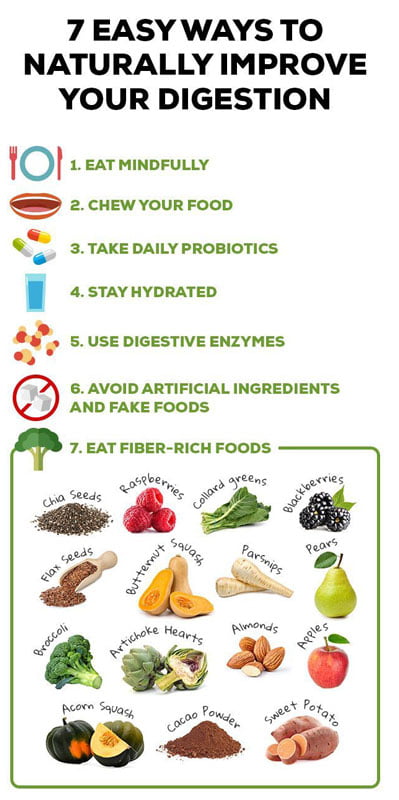Are you experiencing occasional digestive symptoms such as upset stomach, gas, heartburn, nausea, constipation or diarrhoea? Well, all these are quite common. But the occurrence of these symptoms frequently can cause major disruptions to your life. Thankfully, diet and lifestyle changes can have a positive impact on your gut health. Scroll down and find out how you can improve digestion naturally.
Improve Digestion Naturally
Eat Plenty Of Fibre
We all know that fibre is beneficial for good digestion. Including more fibre in the diet will make stools softer and easier to pass, reducing your chances of constipation and improving the health of your digestive tract.
Three common types of fibre are soluble and insoluble fibre, as well as prebiotics. Soluble fibre (found in oat bran, legumes, nuts and seeds etc.) absorbs water and helps add bulk to your stool. Insoluble fibre (found in vegetables, whole grains versions of bread, pasta, rice and wheat bran etc.) acts like a giant toothbrush, helping your digestive tract keep everything moving along. Prebiotics (found in many fruits, vegetables and grains.) is another type of fibre that feed your healthy gut bacteria.
ALSO READ- Constipation Relieving Yoga- 6 Poses For Quick Relief
Avoid Tummy Troubling Food
Cut out all tummy-troubling foods and see if it could be worth a try. Fizzy sodas, too much coffee, rich and spicy foods, and foods that are more likely to cause gas and bloating, such as beans are surefire shortcuts to digestive problems. For some, Dairy can also be a trigger for digestive discomfort.
Diet high in refined carbs, saturated fat and food additives, including glucose, salt and other chemicals — has been linked to an increased risk of developing digestive disorders.
So, eating a diet based on whole foods and limiting the intake of processed foods may be best for optimal digestion.
Get More Exercise
One of the best ways to improve your digestion- is ‘Get Moving.’ Exercise is very important to improve digestion and reduce symptoms of constipation. It can also help reduce inflammation, which may be beneficial in preventing inflammatory bowel conditions.
Daily physical exercise can also help to reduce bloating. It can relieve stress, which in turn affects digestion. Also, take a walk after a meal as it may assist your body in moving things along.
ALSO READ- Big Boss Fame Shehnaz Gill Weight Loss- Lost 12kgs Without Exercise
Stay Hydrated
If you increase your dietary fibre intake or step up your exercise regime, it is very important to increase your water intake also. Drinking more water can help to flush out toxins from your digestive system and reduce the chances of becoming constipated.
Not only water, but you can also meet your fluid intake with herbal teas and other non-caffeinated beverages such as seltzer water. Apart from these, you may eat fruits and vegetables that have a
high water content such as cucumber, zucchini, celery, tomatoes, melons, strawberries, grapefruit and peaches etc.
ALSO READ- Low Sugar Fruits- Perfect For Ketogenic Diet & Diabetes
Stay Away From Stress
Do you know that stress can wreak havoc on your digestive system? Yes, your gut and brain are intricately connected — what affects your brain may also impact your digestion. Stress negatively impacts your digestion and has been linked to IBS, ulcers, constipation and diarrhoea.
So, to improve digestive symptoms, start stress management techniques like deep belly breathing, meditation or yoga. All these may improve not only your mindset but also your digestion.
ALSO READ- Weight Reducing Yoga- 5 Breathing Exercises For Weight Loss
Eat Mindfully
Always pay attention to all aspects of your food (such as texture, temperature and taste) and the process of eating. Never eat too much too quickly otherwise it can lead to bloating, gas and indigestion.
To eat mindfully: Notice how your food looks on your plate and how it smells. Select each bite of food consciously and eat slowly. Turn off your TV, put away your phone and focus on your food.
Chew Thoroughly
Digestion starts in the mouth. Chewing food thoroughly breaks it down so that it can be smoking, drinking too much alcohol and eating late at night aren’t great for your overall health. digested more easily. This also produces saliva, which is needed for the proper mixing of food in your stomach. Chewing food thoroughly ensures that you have plenty of saliva for digestion. This may help prevent symptoms such as indigestion and heartburn.
In any case, common sense tells us that when we bolt our food without chewing properly, it results in more gas and bloating. Taking the time to sit down properly and chew your food slowly will help you take in less air while eating. And you’ll probably find you enjoy the food you’re eating more, too!
Avoid Alcohol & Smoking
Smoking and drinking too much alcohol isn’t great for overall health. Also, these bad habits are responsible for some common digestive issues which double the risk of developing acid reflux, heartburn, and stomach ulcers.
If you want to improve digestion, try to avoid these damaging habits.
ALSO READ- Cure A Hangover: before you drink; while you drink; and the morning after
Incorporate Gut-Supporting Nutrients
Food plays a hugely significant role in how our digestive system works. So, it’s better to use food as a tool to improve our digestive functions and much more besides. If you are wondering which foods can give your digestive system and overall well-being a boost, let me help you-
Certain nutrients such as probiotics (found in fermented foods such as sauerkraut, kimchi and miso, as well as yoghurts that have live and active cultures.), glutamine (found in turkey, soybeans, eggs and almonds) and zinc (shellfish, beef and sunflower seeds) are necessary for a healthy digestive tract.
ALSO READ- 10 Probiotic Foods To Improve Digestion & Boost Immunity
You may also give a sluggish digestive system the kickstart it needs with these foods- Whole grain foods, leafy greens and lean protein. Also ensure that your body gets enough fruits that are lower in fructose like you must prefer berries and citrus fruits over apples, pears and mangoes.
Seek Medical Advice
If your digestive system is affecting your everyday activities, causing you pain or discomfort, it’s advisable to seek medical help. One should never take the problems with the digestive system lightly, especially if one has an underlying health condition.
If you have occasional heartburn or a common stomach bug then these usually don’t cause great concern. But if you are having digestive symptoms that don’t resolve on their own and have been hanging around longer than two weeks, you should be evaluated by a doctor.


